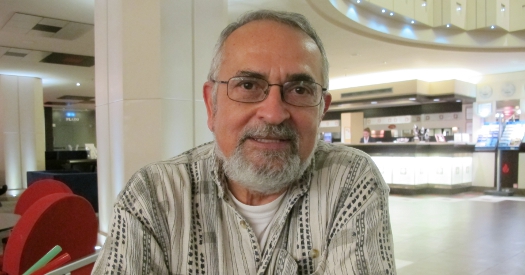Mundo
Andreas Papandreou: “Man of Destiny”
Torn between national identities, careers and a complex relationship with his father, the politician became Greece’s first Socialist premier

In Andreas Papandreou: The Making of a Greek Democrat and Political Maverick (I.B. Tauris, 256 pages, $49 and £30), Stan Draenos depicts a man torn between national identities, academic or political careers and a complex relationship with his popular politician father. The quandaries of Papandreou (1919-96) are proficiently interwoven into the political context involving the United States and Greece during the Cold War. Draenos, who holds a PhD in Political Science from the University of York (Toronto), tells me Papandreou himself eventually responded in a questionnaire: “My first interest was action, politics.” If he could not do that he would be an academic, and failing that, “he would go sailing.”
Focusing on the early years of Andreas’ life, Andreas Papandreou is a fluidly written tour de force that can be reviewed from various angles. Thanks to the Truman Doctrine, set up in 1947 initially to support Greece and Turkey in containing the Soviet Union, American hardliners had a huge impact on the Greek monarchy, military and on the aging George Papandreou, Andreas’ ideologically centrist father who could keep the communists at bay. In fact, in the 1966 elections, against his son’s wishes George worked with Palatial and American forces and forged links with the dominant-right wing party, which was followed by the U.S.-backed coup d’état.
When analyzing Andreas’ decisions, including his rift with his compromising father in the mid-1960s, one enters the realm of psychobiography. Draenos, who worked as a historian for numerous years at the Andreas Papandreou Foundation and knew the former prime minister personally, obviously knows that in this thorny area of scrutinizing “psyches” the historian must stick to facts and avoid speculation.
His witnessing the impotence of the resistance movement against fascism in Greece as a youth may have been one of the factors that led Andreas to immigrate to the United States. There were also other “painful, unresolved conflicts,” the biographer notes, without going any further. Andreas devoted himself to a successful academic career, applauded by intellectuals such as John Kenneth Galbraith. He became a naturalized American in 1944, and his marriage to the American Margaret Chant cemented his new national identity. Two years prior to the wedding, Andreas told her he felt “nostalgia , but no desire to return.”
While chairing a department at the University of California at Berkeley, it would become clear that Andreas was, in fact, the political “man of action” he had at first not wished to become. According to a law passed in 1950, all professors in the State of California had to sign an anti-Communist loyalty document, which included a clause requiring them to inform on their students’ political proclivities. Andreas managed to deal with the reactionary legislators while supporting his colleagues who had been fired and regained their jobs via legal actions. Meanwhile, Andreas himself voted against the law. Like his father, he showed his true colors as a pragmatist; but unlike George Papandreou, the son was no moderate.
Draenos recalls how George clearly stated his support for the Truman Doctrine in an article published by the journal Foreign Affairs. Andreas, for his part, never spoke officially about the matter, but when he first voted in a U.S. presidential election in 1948 his candidate was the left-wing Henry Wallace, who quit the Truman cabinet precisely because he opposed the Truman Doctrine. Nonetheless, while getting U.S. research grants to test the waters, unconsciously or consciously, and possibly enter Greek politics, Andreas chose to follow a more pragmatic moderate stance for at least two apparent reasons.
Firstly, he had to fit the American Government’s perception of him: Andreas was an American who could replace his father’s leadership of the Center Union. Secondly, he was the son of the grandfather of Greek politics, “an object of [Andreas’] devotion,” but also a “mixed blessing,” or, in other words, “a rival to eclipse as well as model to emulate.” As expected, there were jealousies. Konstantinos Mitsotakis, a future premier who expected to be George Papandreou’s successor, described Andreas as an “arriviste” who was “exploiting his father.” Some called him an American, while others suspected he was also a CIA spy.
But in line with Greek’s patriarchal society, George, who had always seen his son as the perfect filial successor as head of the dynasty he had established, tried to lure him back from the United States. We discover an emotional man, prone to psychosomatic symptoms related to a difficult past in his country of birth. In 1953, for instance, Andreas suffered terrible jaw pains following a family reunion in Athens. On other occasions he had intestinal conditions and even a life-threatening disease.
Following his father’s election as premier, in 1964 Andreas was elected to parliament and became assistant prime minister. He returned his American passport and changed his narrative, raising fears he was becoming too distant politically from his father’s centrists politics. One of Andreas’ signature slogans was “Greece for the Greeks,” which seemed to make sense in a country that had been under first British and then American tutelage since World War II.
Andreas’ “social-reform oriented nationalism,” argues Draenos, was also in tune with his times, since hundreds of thousands of Greeks had been leaving the country, where “a sense of alienation” prevailed. Andreas’ new discourse, which helped him return to his Greek roots, included the 1940s’ resistant communist militants who had been excluded from the conservative establishment’s narrative. These days, when the reactionary group Golden Dawn, which has members in the Greek Parliament, uses the same words to incite the beating up of foreigners, Andreas’ slogan sounds inappropriate. Sadly, nationalism has become a force of an extremist organization.
In the end, Andreas was not to be the “American” partner during the Cold War. He opposed the U.S. plan of dividing Cyprus between Greeks and Turks, and, while a nationalist, he sensibly believed that, as Draenos tells me, “the best interest of Hellenism was to keep Cyprus independent and united.” Also, in seeing the intervention of the Greek establishment and the American Government as the real threats – rather than an alliance with the communists –, Andreas revealed himself not to be the son George had expected to replace him.
Andreas was, as Draenos puts it, “a man of destiny.” In Gramscian terms, the former premier was the “charismatic man” who appears when the hegemonic ruling class is no longer trusted by its citizens. In 1974, he founded the first Social Democratic party in Greece, the influential PASOK. He was the first Socialist premier, elected in 1981.
Read more:
Apoie o jornalismo que chama as coisas pelo nome
Os Brasis divididos pelo bolsonarismo vivem, pensam e se informam em universos paralelos. A vitória de Lula nos dá, finalmente, perspectivas de retomada da vida em um país minimamente normal. Essa reconstrução, porém, será difícil e demorada. E seu apoio, leitor, é ainda mais fundamental.
Portanto, se você é daqueles brasileiros que ainda valorizam e acreditam no bom jornalismo, ajude CartaCapital a seguir lutando. Contribua com o quanto puder.



